Recherche avancée

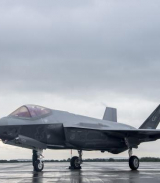 |
Les partenaires européens comme boucliers du F-35
Brèves, 23 déc, 2016
A mesure que les nuages s’accumulent autour de l'avion Joint Strike Fighter F-35 (pas les mêmes nuages qui l’empêchent de voler par temps pluvieux, ou quand ça gèle, ou quand il fait nuit etc.,[1] mais des nuages politiques cette fois-ci…), les participants européens dans le programme, voire l’OTAN dans son ensemble, sont appelés à la rescousse.
|
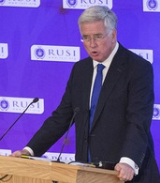 |
Les Britanniques commencent à se poser des questions sur leur relation spéciale avec l'Amérique
Note IVERIS
11 déc, 2016
Illustration parfaite d’un alignement des planètes favorable, comme jamais jusqu’ici, à l’Europe de la défense [1], même les Britanniques commencent à s’inquiéter de leur dépendance. Dans une ambiance européenne générale où, sur le plan rhétorique au moins, les tabous de toujours sont levés les uns après les autrse (tels le concept d’autonomie stratégique, la défense collective, le noyau dur d’Etats membres, le quartier général permanent, ou l’implication de la Commission dans le secteur militaire), un tel début de prise de conscience outre-Manche ne serait pas totalement dénué d’intérêt.
|
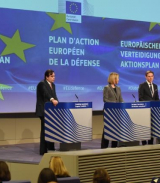 |
La Commission change, timidement, de logiciel sur la défense
Note IVERIS
03 déc, 2016
Avec son Plan d’action européen de la défense, la Commission de Bruxelles amorce un véritable changement de paradigme, à triple titre. La grande nouveauté, c’est la mise à disposition de financements communautaires pour soutenir la recherche et des programmes militaires. Qui plus est, sur deux autres sujets controversés, atlantisme vs. autonomie et ouverture sans limites vs. politique industrielle, elle opère des infléchissements dans un sens positif: vers (un peu) plus d’autonomie et (un peu) plus de politique. Mais elle refuse toujours obstinément d’aller au bout de sa logique.
|
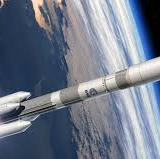 |
Ariane 6 : le début de la fin pour l’industrie spatiale européenne ?
Note IVERIS
01 janv, 2016
Atout stratégique par excellence, le lanceur Ariane est le symbole même de l’Europe spatiale. Fait plutôt rare, c’est un succès à la fois politique, technologique et commercial. Or il risque aujourd’hui d’être détricoté, suite à un transfert inédit de contrôle et de compétences de l’Etat vers des industriels privés.
|
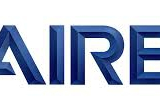 |
Airbus invente l’industrie d’armement apolitique
Note IVERIS
01 déc, 2015
Après avoir délibérément dés-européanisé le nom de son groupe, l'ex-EADS, le PDG d’Airbus reste fidèle à ses convictions. Au sujet de la vente prévue des activités liées à l’électronique de défense d’Airbus, Tom Enders déclare être indifférent à la nationalité de l’acquéreur, puisque seul le prix compte...
|
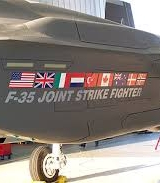 |
Hausse du budget militaire aux Pays-Bas… et davantage de surcoûts prévus pour leurs F-35
Note IVERIS
18 sept, 2015
Depuis des années déjà, les arbitrages budgétaires se font aux Pays-Bas en fonction de l'achat prévu de leurs nouveaux avions de chasse, un achat qui n’a pourtant pas cessé de faire débat. Jusqu’en mars dernier en tout cas, lorsque la signature du contrat pour les huit premiers appareils US a marqué, selon la ministre de la Défense, un « point de non-retour », censé clore ledit débat une fois pour toutes.
|
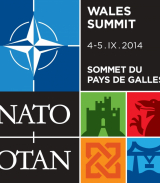 |
L'Alliance atlantique face à la crise ukrainienne (Bilan du sommet de l OTAN au pays de Galles)
Défense & Stratégie n°36, automne 2014
13 nov, 2014
Quelques extraits de l’article « L’Alliance atlantique face à la crise ukrainienne : la réatlantisation de l’Europe (Blian du sommet de l'OTAN au pays de Galles) », qui vient de paraître dans la Revue Défense & Stratégie.
« D’après le discours officiel, le sommet de 2014 de l’Alliance aurait « largement changé d’orientation » à la suite de la crise russo-ukrainienne. En réalité, chacune des supposées nouvelles orientations, chacun des soi-disant changements (tous liés, d’une manière ou d’une autre, au retour en force de la défense collective à travers l’article 5) n’est que la reprise de thèmes et la réaffirmation de priorités qui avaient été prévus depuis longtemps. »
|
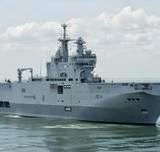 |
Nouvelle tempête de Mistral
Brèves, 20 juil, 2014
Manifestement, toute occasion est bonne à prendre, pour les opposants (nombreux et fervents) de la vente des navires Mistral à la Russie par la France. Aujourd’hui, ils surfent sur l’émotion provoquée par la tragédie de l’avion de ligne malaisien abattu en Ukraine de l’Est. Cette récupération était à attendre. Comme l’avait prédit l’ambassadeur de la France auprès de l’OTAN : « La décision finale [sur les Mistral] doit intervenir en octobre, la pression va s'accroître d'ici là et dépendre, bien entendu, de la situation sur le terrain ». Il n’y a là rien de surprenant. On essaie toujours de tirer profit au maximum des événements d’actualité pour influencer, voire changer au dernier moment, des décisions d’armement.
|
 |
Petites perles de la semaine écoulée - compilation des entrées Google+ (4 mai 2014)
Brèves, 04 mai, 2014
Industries d’armement
1. « L’Europe de la défense est dans un état épouvantable », observe le président d’Airbus Group, Tom Enders, devant le Conseil Atlantique. Merci à qui ? A M. Enders et compagnie (tant parmi les financiers-industriels que parmi les politiques). Ce sont eux qui nous avaient engagés dans la voie de l’érosion/transatlantisation en refusant obstinément d’instaurer la préférence européenne, et en faisant valoir, en Europe même, la consigne « Buy American ». Ou en « normalisant » les groupes d’armement (le terme désigne, dans le novlangue européen, l’éviction de l’Etat de l’entreprise et, avec lui, la négation, par principe, de toute considération politico-stratégique). Ou en cherchant à se déresponsabiliser toujours davantage sous couvert de « spécialisations » et de fusions en tout genre. Ou encore en jugeant que l’adjectif « européen » est un gros mot dont il convient de débarrasser EADS au plus vite, afin de ne pas compromettre ses mirobolantes chances en Amérique.
|
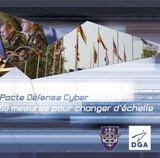 |
Pacte Défense Cyber : gare aux alliances !
Theatrum Belli
02 mars, 2014
Le Ministère de la défense a présenté récemment son « Pacte Défense Cyber », un plan d’action en 50 points pour cadrer ses actions en matière de cyberdéfense. Jusqu’ici, rien de plus normal, il s’agit évidemment d’un enjeu d’importance cruciale. Toutefois, ce qui retient immédiatement l’attention, c’est la tension (voire contradiction) entre d’une part l’impératif de souveraineté dans ce domaine hautement stratégique et, de l’autre, l’insistance du Pacte sur des cadres de coopération internationale où, c’est le moins que l’on puisse dire, les partenaires de la France ne partagent pas forcément ce souci.
|
 |
La Pologne, objet de toutes les convoitises...
Brèves, 30 janv, 2014
L’agenda du Secrétaire américain à la défense ne laisse aucun doute : les Etats-Unis sont prêts à employer les grands moyens pour courtiser leurs alliés polonais, l’un des rares pays européens à augmenter leurs efforts de défense dans le contexte actuel. En effet, le « Plan de modernisation technique des Forces Armées de la République polonaise pour les années 2013-2022 » est un appât bien tentant.
|
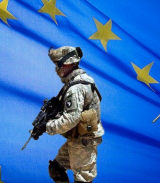 |
Pente glissante : la réatlantisation de l Europe de la défense
The Federalist Year LV, 2013
31 déc, 2013
La réatlantisation de l’Europe de la défense est en marche.[1] Que ce soit la crise en Ukraine, offrant visiblement un formidable prétexte aux efforts de rebond de l’OTAN ; ou notre inexorable enfermement dans le piège de la coopération avec l’Amérique en matière d’armement ; ou les pressions qui s’accentuent pour civilianiser la PSDC y compris ses groupements tactiques ; ou encore le nouveau discours de symbiose transatlantique ; il s’agit à chaque fois de manifestations palpables d’un choix délibéré de la part des élites euro-occidentales. Un choix qui va pourtant à contre-courant de ce que dicteraient les événements, le bon sens, nos intérêts et notre dignité. Sans parler du désir (assez peu perceptible, il faut le dire) de tenir, tant bien que mal, notre place dans la « mêlée mondiale »
|
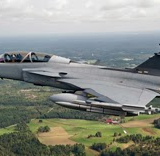 |
Le Gripen au Brésil: un choix pro-américain faute de mieux ?
Notes d’actualité, 21 déc, 2013
Avec le Gripen, le Brésil se résigne à acheter américain, par la petite porte. Peut-être aussi parce qu’il estime ne pas avoir d’autre option, en fin du compte ? Pour rappel, près d'un cinquième des composants de l’avion suédois proviennent des Etats-Unis. Ce qui fut clairement un argument de vente en Europe centrale, dans des pays notoirement pro-américains. Ainsi s’y soulignait-on avoir choisi un appareil dont la turbine est à 60% fabriqué par General Electric, dans l'espoir d’atténuer l’offense faite à l’allié US qui avait employé les grands moyens pour vendre ses F-16.
|
 |
Petites perles de la semaine écoulée (10 novembre 2013) - compilation des entrées Google+
Brèves, 10 nov, 2013
NSA/Europe
1. L'ambassade britannique à Berlin écoute les conversations des Allemands. Ajoutons juste deux précisions au sujet de la coopération des « Cinq yeux », au nom de laquelle le Royaume-Uni espionne, pour le compte des Etats-Unis, ses partenaires européens. Primo, dans le système Echelon (le réseau d’interception des communications opéré depuis des décennies par les cinq pays anglophones UK, USA, Canada, la Nouvelle Zélande et l’Australie), le monde entier est divisé en zones de responsabilité géographique. Et Londres y a la charge de surveiller l’Europe, proximité oblige.
|
 |
Petites perles de la semaine écoulée (3 novembre 2013) - compilation des entrées Google+
Brèves, 03 nov, 2013
NSA/Europe
1. Berlin, nid d’espions US. Visiblement, la Chancelière devient susceptible quand on touche à son portable. Pour rappel : jusqu’à la nouvelle que son « instrument de puissance » favori pourrait être surveillé par la NSA, Mme Merkel avait fait profil bas. Elle ne s’était pas offusquée outre mesure en apprenant cet été que ses compatriotes furent massivement écoutés par les services US, ni ne s’était montrée vraiment compatissante quand son partenaire français s’offusquait il y a une semaine. Mais tout ça, c’était avant l’affaire du portable. Depuis, elle n’arrête pas de s’indigner à tout va. Compte tenu des dernières précisions, elle aura encore de quoi.
|
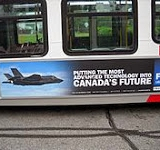 |
Le syndrome JSF au Canada
Notes d’actualité, 12 oct, 2013
Le Canada espère remédier aux anomalies de son système d’acquisition d’équipements militaires grâce à des réformes organisationnelles. On lui souhaite bon courage. Sachant qu’il ne peut s’agir que d’améliorations de façade. Car la centralisation du processus d’acquisition de défense (lequel passe aujourd’hui par trois ministères différents), ne le fera pas sortir du carcan américain pour autant. Sur la base du Defense Production Sharing Agreement de 1956, il s’y est solidement établi une coopération nord-américaine fort déséquilibrée, source de distorsions et d’ennuis constants.
|
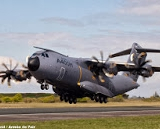 |
L'A400M dans une optique américaine
Notes d’actualité, 02 oct, 2013
Certes les Etats-Unis ne pourront pas ne pas se réjouir officiellement, en voyant leurs alliés commencer à combler l'une des principales lacunes capacitaires qu'ils leur reprochent depuis si longtemps. Mais ce n'est que la façade. L'A400M est un concurrent et un outil d’autonomie européenne comme ils ne les aiment pas. Un article du Washington File du Département d’Etat datant de 2006 précise déjà que « Les US recommandent aux alliés OTAN de mettre en commun de l’argent pour acheter des C-17 ». Une solution présentée comme bénéfique pour les affaires de Boeing et qui serait du même coup la meilleure façon de pallier les carences des Européens en matière de transport stratégique.
|
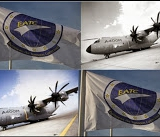 |
L'A400M dans une optique européenne
Notes d’actualité, 02 oct, 2013
Comme l'a dit Hervé Morin, ministre de la défense en 2010: «L'A400M est un programme emblématique sur lequel les Européens ne pouvaient pas renoncer ». En effet, son arrivée signifie plus pour la « défense européenne » que n'importe quelle déclaration pompeuse à l'issue d'une quelconque réunion au sommet. Premièrement, parce que la nouvelle flotte d'avions de transport stratégique (et tactique, l'A400M étant hautement polyvalent) va résorber ce qui fut identifiée comme l'une des lacunes capacitaires majeures de l'Europe de la défense, dès le lancement de celle-ci il y a déjà quinze ans.
|
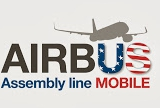 |
Le tropisme transatlantique du président d’EADS
Notes d’actualité, 28 sept, 2013
En parlant des perspectives de « l’aéronautique transatlantique », Tom Enders joue cartes sur table maintenant. Dès le départ, son intention d'évincer les Etats européens d'EADS et son désir de le transformer en une compagnie de facto américaine formaient un tout inséparable. C'est logique, ce sont les deux faces de la même médaille.
|
 |
Lectures de la semaine (4 août 2013)
Brèves, 03 aout, 2013
Le Service européen d'action extérieure (SEAE) vient d'apporter à son tour une première pierre au sommet « Défense » de décembre. Notamment sous la forme d’un rapport, intitulé « Révision stratégique », sur sa propre organisation et fonctionnement.
|
 |
La Commission s'immisce dans les affaires d'armement
Notes d’actualité, 29 juil, 2013
En proposant, le 24 juillet dernier, un plan d’action « visant à accroître l’efficacité et la compétitivité du secteur de la défense », La Commission européenne n’en est pas à son premier essai. Notamment pour se mêler de ce qui ne fut pourtant jamais censé être ses affaires.
|
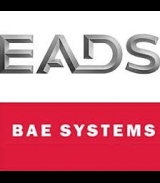 |
Les politiques d’armement en Europe à travers l’exemple de l’affaire BAE Systems-EADS
Défense & Stratégie n°33, automne 2012
15 nov, 2012
La tentative de fusion entre British Aerospace System (BAESystems)[1] et European Aeronautic Defence and Space Company (EADS)[2] a échoué malgré les louanges de la presse et en dépit du soutien que lui apportaient, sous le double slogan de « l’Europe » et de « l’efficacité/rentabilité », à la fois les politiques et le monde des affaires. Cet échec fut-il inéluctable ou le fruit d’un heureux concours de circonstances ? Une chose est certaine : qu’il s’agisse de ses acteurs, de son ambition ou de sa méthode, derrière la prétendue logique d’une telle fusion, transparaissent de toutes autres considérations.
|
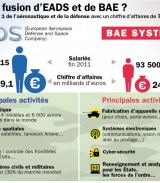 |
L’échec de la fusion BAE-EADS : que reste-t-il après une tentative de trahison ? L’intention…
Theatrum Belli
19 oct, 2012
La faillite du projet de fusion BAE-EADS fut accueillie par un mélange de déception, de tristesse et de noble fureur par la quasi-totalité des commentaires. Déception et tristesse pour l’Europe, supposée être la grande perdante de l’affaire, et fureur contre les Etats égoïstes, qui auraient manqué cette superbe occasion rien que pour satisfaire leurs vilains intérêts. En y regardant de plus près, ce poignant récit devient exactement son inverse. L’Europe devrait être soulagée d’avoir reçu une seconde chance avant de se réveiller un jour pour voir son secteur stratégique télécommandé depuis Washington par le duo Pentagone-Maison Blanche. Et le seul reproche que l’on puisse faire aux gouvernements (à part leurs mobiles, parfois bien piteux au regard des enjeux), c’est qu’ils n’ont pas été plus fermes.
|
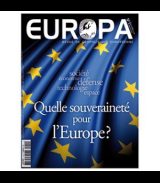 |
Autonomie ou assujettissement : la dimension militaire de l'impératif de souveraineté européenne
Europa, n°1, novembre 2009
15 nov, 2009
Aussi complexe que puisse paraître le sujet indiqué dans le titre, le point de départ de l’analyse peut être réduit à trois constats simples. Dès qu’il s’agit de souveraineté, nos rapports avec l’Amérique sont au cœur du problème. Or, les relations transatlantiques ont pour caractéristique fondamentale la dépendance européenne. Or, l’indépendance est la condition sine qua non de la crédibilité et du libre-arbitre ou, en d’autres termes, de l’existence même au sens géopolitique.
|
 |
Europe européenne ou Europe atlantique : une question de «préférence»…
La Lettre Sentinel n°47, octobre 2007
31 oct, 2007
Ces derniers mois ont vu le retour en force du bon vieux débat « protectionnisme » versus libéralisme. Autrement dit, sur les rôles respectifs du politique et de l’économique, ou encore le face-à-face entre logique de puissance et logique du marché. Avec la question implicite sur la nécessité d’une « préférence européenne », et la mise à nu immédiate des contradictions inhérentes du credo libéral-atlantiste.
|
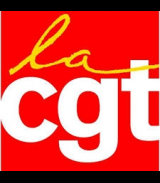 |
Le secteur de l’armement face aux grands défis de la construction européenne
Colloque syndical européen de la FNTE CGT
29 sept, 2007
Comment concilier deux logiques fondamentalement différentes: celle du secteur de l'armement avec tous les impératifs stratégiques qui y sont liés, et celle de la construction européenne qui oscille entre entité quasi politique et grand marché? Intervention au Colloque syndical européen de la FNTE (Fédération Nationale des Travailleurs de l'Etat) de la CGT.
|
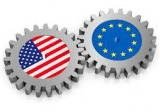 |
Les questions d’armement sous un éclairage transatlantique
Présentation à l’Université d’été du CIFE-IEHEI
04 sept, 2007
Après avoir relevé quelques enjeux liés au secteur de l’armement, un bref rappel historique propose de clarifier le contexte des débats actuels. On abordera ensuite certaines caractéristiques générales de l’industrie de défense américaine d’une part, européenne de l’autre. Finalement, des mythes trompeurs seront décryptés, notamment l’imposture de l’« écart » technologique, la sainte horreur inspirée par la notion d’« Europe forteresse » et l’éloge tendancieux de la « complémentarité ».
|
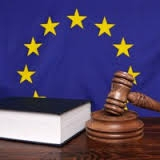 |
Article 296: ami ou ennemi?
EuroFuture Magazine, Winter 2006
01 janv, 2007
Le secteur de l'armement est le champ stratégique par excellence, que ce soit en termes géopolitiques, économiques ou technologiques. Du fait de la coïncidence entre les questions les plus abstraites liées à la souveraineté et la nature la plus tangible des produits (origine, composition, conception), les politiques poursuivies dans ce domaine sont particulièrement indicatives de, et déterminantes pour, la direction que l'Europe est sur le point de prendre.
|
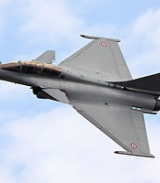 |
L'article 296 du TCE : obstacle ou garde-fou ?
Défense & Stratégie n°18, octobre 2006
31 oct, 2006
Assiégé de toutes parts, l’article 296 (ex-article 223) du traité instituant la Communauté européenne apparaît pour certains comme un anachronisme. En établissant une dérogation générale au droit communautaire dans le domaine de la production et du commerce du matériel militaire, il serait l’incarnation même d’un « protectionnisme » hideux, rétrograde, anti-marché et anti-européen.
|
 |
Vers quel « marché commun » en matière d’armement ? (sur le code de conduite volontaire sur les marchés publics d’équipements de défense)
Biztonságpolitikai és Honvédelmi Kutatások Központ
06 oct, 2006
Le dénommé code de conduite, entré en vigueur le 1 juillet 2006 avec la participation de 22 Etats-membres de l’Union et censé encourager « l’européanisation » des marchés publics d’équipements militaires, n’est que le début. Il marque notamment l’entrée en scène, en des termes implacablement concrets, des questions politiques fondamentales (différées depuis plus d’un demi-siècle) de la construction européenne. En tant que début, il est par nature imparfait et ambigu. Mais reflète à merveille les possibilités et les limites de la volonté politique qui est à son origine.
|
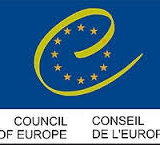 |
Les outils de l’indépendance de l’Europe
Colloque à Strasbourg, au Conseil de l'Europe
05 oct, 2006
Pour ce qui est du choix systématiquement occulté entre dépendance ou indépendance européennes, dans les textes, tout semble clair comme de l’eau de roche. Au moment du lancement de la PESD (politique européenne de sécurité et de défense), en juin 1999 à Cologne, la déclaration des Quinze stipule d’emblée l’exigence d’autonomie et de crédibilité des moyens de l’Union. Ce qui s’inscrit parfaitement dans les objectifs déclarés à l’article 11 du Traité sur l’Union européenne, notamment « la sauvegarde des valeurs communes, des intérêts fondamentaux, de l’indépendance et de l’intégrité » de l’UE. Toutefois, non seulement nous sommes toujours en attente pour voir quand ces belles paroles seront-elles traduites dans les actes, mais la question même de savoir si elles devraient l’être un jour reste objet de débat.
|
 |
Prospective sur la défense européenne
Biztonságpolitikai és Honvédelmi Kutatások Központ
06 aout, 2006
Il convient d’abord de souligner que ni les élections françaises de 2007, ni celles aux Etats-Unis en 2008 n’altèreront de manière notable – c’est-à-dire outre les gestes et effets d’annonce programmés pour ces occasions – les orientations traditionnelles de la politique étrangère et de sécurité des pays en question. De même, les péripéties du nouveau traité européen, le rythme effectif de la fuite en avant de l’UE par l’élargissement, et les multiples initiatives transatlantiques basées sur des changements d’emballage à Washington sont parfaitement secondaires du point de vue de l’évolution réelle de la construction européenne et de nos relations avec les Etats-Unis.
|
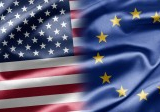 |
Les relations transatlantiques à la lumière des industries d’armement
Lecture at Jozsef Antall Foundation, Corvinus University
05 avril, 2006
Les limites du présent cadre ne permettent que d’esquisser une vue d’ensemble forcément approximative des processus politiques et des enjeux stratégiques qui se trouvent derrière les dossiers d’armement. La ligne directrice en est simple : dans le domaine des industries et des technologies d’armement, il s’agit des bases matérielles de la souveraineté, autrement dit des piliers concrets de la capacité autonome de décision et d’action. Chacune des mesures en matière de recherche, de développement, de production et d’acquisition est une décision politique au sens le plus strict du terme. C’est en cette qualité qu’elle doit être appréhendée et transférée du cercle restreint des spécialistes vers la place publique. Car les décisions politiques méritent débat politique.
|
 |
Histoire d'avions entre les deux rives de l'Atlantique 2 (Airbus vs. Boeing)
Népszabadság Online
30 avril, 2005
« Pourquoi le gouvernement américain soutient-il et subventionne-t-il l’industrie aéronautique américaine à travers des contrats de la défense ? Simplement parce que l’avenir des USA, et celui de l'Europe dans notre cas, ne réside pas dans les parfums ou les pop-corns. L’avenir, c’est l'électronique, l’informatique, l'avion, les missiles et l'espace. » - la remarque a été faite par Jean Pierson, ex-président d'Airbus Industrie, en 1987.
|
 |
Histoire d'avions entre les deux rives de l'Atlantique 1 (Joint Strike Fighter/F35)
Népszabadság Online
08 avril, 2005
L’histoire mouvementée de l’avion militaire Joint Strike Fighter (F35) est une véritable petite fable édifiante. Elle nous permet de contempler d’un côté les mécanismes de fonctionnement parfois presque pervers de la politique étrangère et de défense des Etats-Unis et, de l’autre, le processus d’abandon volontaire des positions et des atouts européens. Bref, il s’agit d’un condensé éminemment instructif de l’ensemble des relations transatlantiques.
|
|
 |
Les plus lus


|



